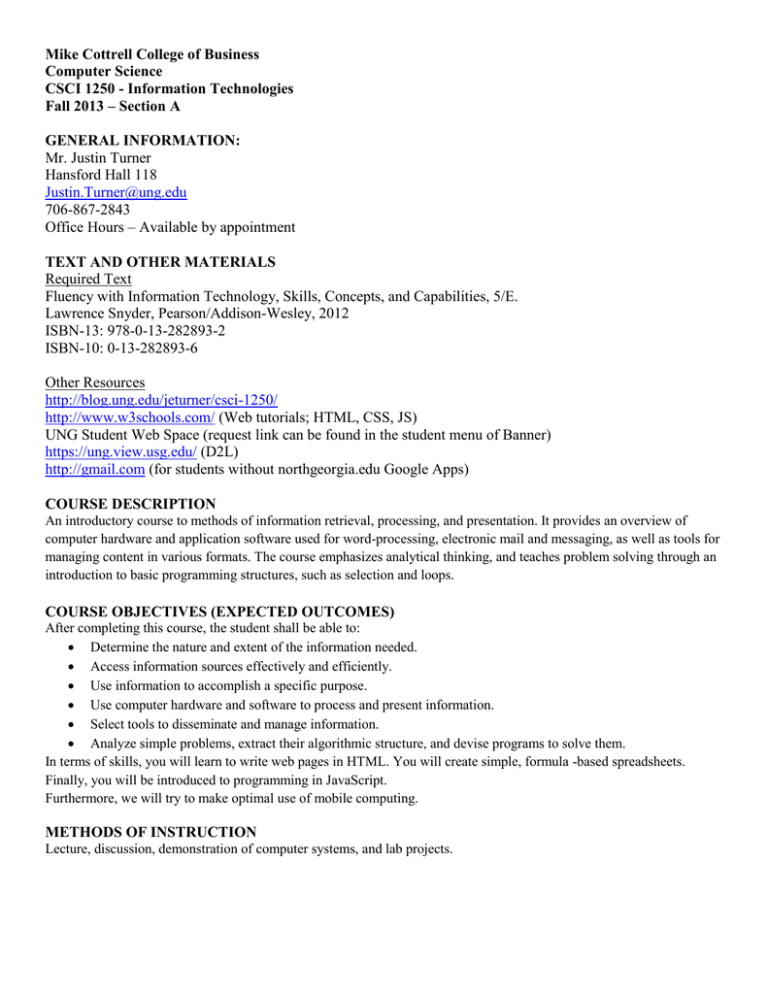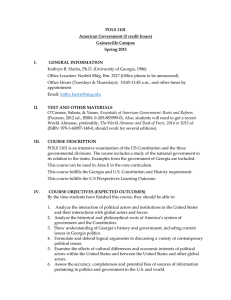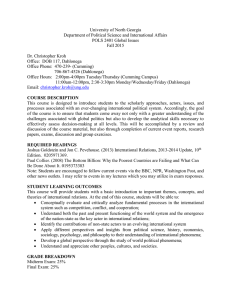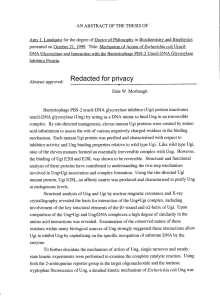
Mike Cottrell College of Business
Computer Science
CSCI 1250 - Information Technologies
Fall 2013 – Section A
GENERAL INFORMATION:
Mr. Justin Turner
Hansford Hall 118
Justin.Turner@ung.edu
706-867-2843
Office Hours – Available by appointment
TEXT AND OTHER MATERIALS
Required Text
Fluency with Information Technology, Skills, Concepts, and Capabilities, 5/E.
Lawrence Snyder, Pearson/Addison-Wesley, 2012
ISBN-13: 978-0-13-282893-2
ISBN-10: 0-13-282893-6
Other Resources
http://blog.ung.edu/jeturner/csci-1250/
http://www.w3schools.com/ (Web tutorials; HTML, CSS, JS)
UNG Student Web Space (request link can be found in the student menu of Banner)
https://ung.view.usg.edu/ (D2L)
http://gmail.com (for students without northgeorgia.edu Google Apps)
COURSE DESCRIPTION
An introductory course to methods of information retrieval, processing, and presentation. It provides an overview of
computer hardware and application software used for word-processing, electronic mail and messaging, as well as tools for
managing content in various formats. The course emphasizes analytical thinking, and teaches problem solving through an
introduction to basic programming structures, such as selection and loops.
COURSE OBJECTIVES (EXPECTED OUTCOMES)
After completing this course, the student shall be able to:
Determine the nature and extent of the information needed.
Access information sources effectively and efficiently.
Use information to accomplish a specific purpose.
Use computer hardware and software to process and present information.
Select tools to disseminate and manage information.
Analyze simple problems, extract their algorithmic structure, and devise programs to solve them.
In terms of skills, you will learn to write web pages in HTML. You will create simple, formula -based spreadsheets.
Finally, you will be introduced to programming in JavaScript.
Furthermore, we will try to make optimal use of mobile computing.
METHODS OF INSTRUCTION
Lecture, discussion, demonstration of computer systems, and lab projects.
EVALUATION METHODS & COURSE GRADING
Grading Scale
Item Weight
90% and Above A
2 Tests 30%
80% and Above B
Final Exam 20%
70% and Above C
Labs 20%
60% and Above D
Projects 30%
Below 60% F
Total 100%
Exams:
Examination will be of mixed format, i.e. short answer, true/false, multiple choice, and programming problems.
It is strongly recommended to review the Review Exercises section at the end the chapters that we cover.
COURSE CALENDAR
Important Dates: http://ung.edu/academics/academic-calendar.php
Week Topic
Chapters
1
Information, HCI, Computer Networks 1 – 3
2
Computer hardware. Office
9, notes
applications, an overview.
3
Spreadsheets, Google Forms
13, notes
4
Spreadsheets (cont.)
14
5
How is information represented
7–8
digitally?
6
Privacy and Digital Security
11 – 12
7
Introduction to HTML
4
8
Style Sheets (CSS), on-line information 4 – 5
9
Intro to programming
10, notes
10
JavaScript 1
17, notes
11
JavaScript 1 (cont.)
17 – 18, notes
12
JavaScript 2
19, notes
13
JavaScript 3
20, notes
14
Putting it together; problem solving
21, notes
15
Reserve
*Class will be held via D2L on these dates.
Fall 2013 Dates
Aug 21, 23
Aug 26, 28, 30
Sept 4, 6
Sept 9, 11, 13
Sept 16*, 18, 20*
Sept 23*, 25*, 27*
Sept 30, Oct 2, 4
Oct 7, 9, 11
Oct 14, 16, 18
Oct 21, 23, 25
Oct 28, 30, Nov 1
Nov 4, 6, 8
Nov 11, 13, 15
Nov 18, 20, 22
Dec 2, 4, 6
SUPPLEMENTAL SYLLABUS
Students are expected to refer to the Supplemental Syllabus for the following information:
1. Academic Exchange
2. Academic Integrity Policy
3. Academic Success Plan Program
4. Class Evaluations
5. Course Grades and Withdrawal Process
6. Disruptive Behavior Policy
7. Inclement Weather
8. Smoking Policy
9. Students with Disabilities




